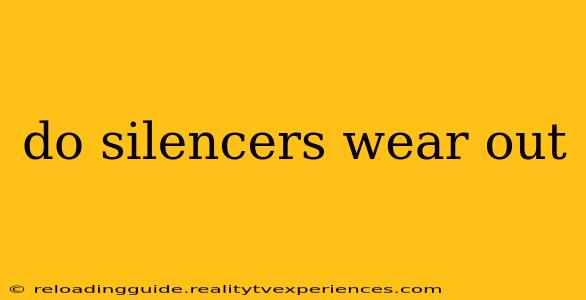Suppressors, often called silencers, are increasingly popular among firearm enthusiasts for their noise-reducing capabilities and other benefits. However, a common question arises: do silencers wear out? The short answer is yes, but the lifespan and rate of wear depend on several critical factors. This guide delves into the intricacies of suppressor longevity, helping you understand what contributes to their wear and tear and how to maximize their lifespan.
Factors Affecting Suppressor Lifespan
Several factors contribute to the eventual wear and tear of a suppressor. Understanding these helps responsible gun owners predict and mitigate potential issues.
1. Round Count and Use Frequency:
This is arguably the most significant factor. Just like any mechanical device subjected to repeated use, suppressors degrade with each shot fired. The higher the round count, the faster the components will wear. High-frequency use, such as daily range practice, accelerates this process compared to occasional recreational shooting.
2. Caliber and Cartridge Type:
Larger calibers and high-pressure cartridges exert significantly more force on the suppressor's components. This increased stress accelerates wear and tear on baffles and other internal parts. Subsonic ammunition, on the other hand, generally places less stress on the suppressor, extending its operational life.
3. Cleaning and Maintenance:
Regular and proper cleaning is paramount to extending the life of your suppressor. Buildup of carbon, fouling, and corrosive residue can accelerate wear, damage internal components, and even compromise the suppressor's performance. A neglected suppressor will degrade much faster than a well-maintained one.
4. Material and Construction:
Suppressor construction varies widely, influencing durability. High-quality materials like stainless steel and titanium generally offer greater resistance to wear and corrosion compared to cheaper alternatives. The design and manufacturing precision also play a role; robust designs are better equipped to handle the stresses of repeated firing.
5. Environmental Factors:
Exposure to harsh environments, such as extreme temperatures, humidity, or corrosive elements, can significantly affect a suppressor's longevity. Proper storage in a controlled environment helps minimize this type of degradation.
Signs Your Suppressor Needs Attention
Several indicators signal potential wear or issues with your suppressor:
- Increased Backpressure: Noticeable increases in felt recoil or muzzle blast can indicate internal blockage or damage.
- Reduced Sound Suppression: A decrease in noise reduction suggests potential baffle damage or other internal problems.
- Visible Damage: Inspect your suppressor regularly for any signs of physical damage, such as dents, cracks, or loose components.
- Difficulty Disassembling/Cleaning: If cleaning or disassembly becomes unusually difficult, this may signify a problem that requires professional attention.
Maximizing Your Suppressor's Lifespan
Proactive measures significantly extend the service life of your suppressor:
- Regular Cleaning: Follow the manufacturer's recommended cleaning schedule and procedures diligently.
- Proper Storage: Store your suppressor in a clean, dry, and temperature-controlled environment.
- Use Appropriate Ammunition: Opt for ammunition that's compatible with your suppressor's specifications to reduce wear.
- Regular Inspection: Visually inspect your suppressor regularly for any signs of damage.
- Professional Maintenance: Consider periodic professional inspection and maintenance by a qualified gunsmith to catch potential problems early.
Conclusion: Responsible Suppressor Ownership
While silencers do wear out over time, responsible ownership and regular maintenance can significantly extend their lifespan. By understanding the factors influencing suppressor longevity and adhering to proper care procedures, you can enjoy years of reliable and effective noise reduction. Remember to always consult your suppressor's manufacturer's instructions for specific cleaning and maintenance recommendations.

